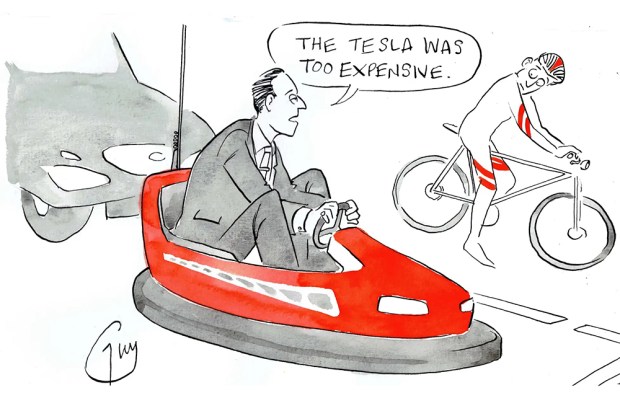Vince Cable and Michael Fallon, ministers responsible for the Royal Mail sell-off, have been summoned for another select committee grilling after Easter. Meanwhile, Labour’s irritatingly smug business spokesman Chuka Umunna continues to score points by claiming that last October’s flotation was ‘botched’, costing taxpayers a notional £750 million as the shares leapt from the issue price of 330 pence to 455 pence on the first day, and much more since as they rocketed on upwards.
The truth is that the ministerial duo were right to be super-cautious about pricing a privatisation that had been thwarted for so long by union subversion, for which public enthusiasm was uncertain, and in which taxpayers would continue to hold a 30 per cent stake. Right also to rely on advisers — chiefly Lazards, relying in turn on consultation with the rest of the City — to recommend a level at which the issue could be safely got away, rather than pitched at higher risk to extract the last pound. The fact that it took off like the hottest dotcom in town was predicted by no one, even analysts whose early valuations were well above 330 pence.
So the outcome was a prize example of the capriciousness of markets: if at a late stage Cable had sniffed the air and told Lazards to whack the price up to £4, demand would have shrivelled and subsequent performance would have been completely different. On the other hand, the business secretary was clearly misguided when he referred to 16 ‘priority’ institutions as ‘a core of high-quality investors who would be there in good times and bad’. They were not contractually or morally committed to that role, and they behaved rationally by taking profits when the price surge took them by surprise like everyone else.
Neither ministers nor select committee members really understand this stuff, I’m afraid, so another televised show trial will achieve little. Better to aim a barb at Lazards, plus Goldman Sachs, UBS, Merrill Lynch and Barclays in the ‘book-building’ role: for all your smooth talk, boys, if new issues like this one are such a maddeningly inexact science, remind us why you deserved £14 million of fees?
Kerry gold
This column comes from County Kerry, where I’m staying in a lovely Georgian house in the middle of a golf course that offers a view of MacGillycuddy’s Reeks and a parable of boom and bust. The verdant 18-hole course used to be the home farm in the days when landowners in these parts prospered by supplying the creameries that made Kerry-gold butter. By the mid-1990s, golf looked a better bet — and then came Ireland’s real estate bonanza. My host was approached by a new-rich builder: ‘He offered x for the golf course with planning permission for a hotel. It was a lot of money, but we didn’t want to sell. Then he offered one-and-a-half x, and finally in September 2007, 2x. We really couldn’t say no.’ The hotel scheme sprang out of the ground behind the old farmyard, but the builder — who had borrowed 100 per cent of his funding from Irish banks, with not a penny of equity in the project — swiftly went bust.
Now it’s all about to be offered for sale again by Nama, Ireland’s ‘bad bank’ repository of foreclosed real estate assets. At what sort of price? ‘Maybe a quarter of x,’ says my friend. ‘There’s not much demand for golf courses these days.’ But there’s plenty of demand for agricultural land, which according to Savills fetches almost £19,000 per Irish hectare compared to £15,415 in the UK, having soared in the boom and stayed high. So cattle might once more graze this rich pasture, ivy will slowly clad the hotel’s half-built shell like an abandoned Ascendancy mansion, and what happened to Ireland these past few years will come to be remembered as a kind of dream.
Alternative line from Dawlish
I had the misfortune to be two days early for the reopening of the storm-damaged railway line at Dawlish. Trying to reach Torquay to speak to a conference, I had to resort to buses and taxis beyond Exeter — but taxi drivers are the journalist’s friend, and the one who picked me up at Newton Abbott provided an antidote to David Cameron’s hyperbole about the ‘Herculean efforts’ of Network Rail’s ‘orange army’ of construction workers and the contractor who declared: ‘The amount of concrete that’s gone in there, that will be there for at least 200 years, beyond a shadow of a doubt.’
My man had been chauffeuring members of the orange army from lodgings to site these past few weeks, and what they told him, he said, was that the job had been rushed for the Prime Minister’s visit, that its £35 million budget had been barely adequate, and that ‘If there’s another storm like the last one, we’ll be lucky if it lasts five years.’
I pass that on for what it is — secondhand chat from a single source. But I have a feeling that Network Rail, with its ‘not for dividend’ renationalised ownership, doesn’t attract nearly enough public scrutiny and stick. I have been observing with a quizzical eye the construction of a new £30 million operations centre at York which, from next year, will control all signalling on the east coast line from London to the Scottish borders. This spacious complex ‘will ultimately generate savings of £65 million’ — and I suggest regular travellers on the route brace for the day when a minister switches it all on and watches the screens go blank, in the manner of the jinxed national air traffic control centre at Swanwick.
Meanwhile, Network Rail faces fines of £70 million for dropping below 90 per cent punctuality in the latest measurement period, a five-times bigger penalty than its own previous record. That doesn’t inspire confidence in this strange entity’s promise to provide ‘more trains, more seats and quicker, greener journeys’ over the next five years. I also wonder, incidentally, what on earth is the point of depriving it of £70 million that it should clearly be spending on stronger repairs and more reliable signals.
Got something to add? Join the discussion and comment below.
Get 10 issues for just $10
Subscribe to The Spectator Australia today for the next 10 magazine issues, plus full online access, for just $10.
You might disagree with half of it, but you’ll enjoy reading all of it. Try your first month for free, then just $2 a week for the remainder of your first year.














Comments
Don't miss out
Join the conversation with other Spectator Australia readers. Subscribe to leave a comment.
SUBSCRIBEAlready a subscriber? Log in